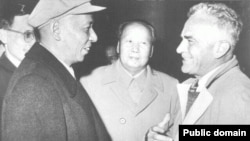Nearly 50 years after the death of Edgar Snow, a Missouri journalist who covered the early years of the Chinese Communist Party, Beijing still praises him as the model foreign reporter.
Snow interviewed Chairman Mao Zedong several times. He is presented by the Communist Party as a “friend of China.” He is often a character in Chinese films. Officials say China wants more “Snows of this new era among foreign #journalists.”
During celebrations for the Communist Party one-hundred-year anniversary this summer, the state-run China Daily announced the beginning of what it called the Edgar Snow Newsroom of the New Era. All the employees will be foreigners.
In June, the English-language China Daily wrote the aim of this newsroom is to present a “true” look at China and all the points of view of the country. For Human Rights Watch researcher Yaqiu Wang, that means disinformation.
VOA made several attempts to talk with a representative of China Daily, but all messages were not answered.
Media plan
As Beijing uses the story of Snow, foreign reporters are being sent home or finding their abilities to report limited.
Political experts and reporters who cover China see the Edgar Snow Newsroom as representative of Beijing’s efforts to control foreign coverage and influence public opinion.
Julia Bergin is co-writer of two reports on China’s international media influence for the International Federal of Journalists (or IFJ). She believes the newsroom could be used to force foreign news media to depend on content from Chinese state-run outlets at a time when it is harder for reporters to get visas to work in China.
IFJ research found China has developed content sharing agreements with many international outlets to export favorable coverage. It has invested in equipment and recording spaces for overseas newsrooms. It runs exchanges and training programs, often granting places in those programs to journalists from countries that have weaker relations with the West.
Cédric Alviani is head of the East Asia division at Reporters Without Borders. He agrees, and he says that China has such a large propaganda machine that it does not need foreign reporters. He says China sees them as unwanted observers and that is why it has started to make them leave.
Over 12 American journalists have been for forced to leave China recently. China restricted entry to journalists after the Trump administration reduced the number of Chinese employees at five state-controlled media organizations in the U.S.
Liu Pengyu is a spokesperson for the Chinese Embassy in Washington. He told VOA by message that the country welcomes foreign media.
Pengyu said that if journalists follow the law while reporting, “there is no need to worry.” However, he said China opposes any ideological beliefs that are against the country, any fake news under the “so-called ‘freedom of the press,’” and any behavior that violates the professional guide of journalism.
Rebecca MacKinnon was the head of CNN’s Beijing office from 1998 to 2001. She believes an Edgar Snow Newsroom carries large propaganda value within China. She said by attaching Snow’s name to the newsroom, the state is telling the Chinese population what sort of journalist to talk to.
Reporting restrictions
In Snow’s time, he had access that foreign reporters today say is no longer possible. Even finding Chinese citizens willing to talk to the foreign press is difficult.
One international journalist who did not want to be identified said it used to be easy to talk to anyone, even on some sensitive subjects. The journalist said, “And there was a willingness to talk to foreign media, which has ... gotten worse and worse, by the day.”
I’m Gregory Stachel.
Liam Scott reported this story for Voice of America. Gregory Stachel adapted it for VOA Learning English. Susan Shand was the editor.
___________________________________________________________________
Words in This Story
era – n. a period of time that is associated with a particular quality, event, or person
journalism – n. the activity or job of collecting, writing, and editing news stories for newspapers, magazines, television, or radio
disinformation – n. false information that is given to people in order to make them believe something or to hide the truth
ideological – n. the set of ideas and beliefs of a group or political party
access – n. permission or the right to enter, get near, or make use of something or to have contact with someone
sensitive – adj. needing to be handled in a careful or secret way in order to protect someone or something
assumption – n. something that is believed to be true or probably true but that is not known to be true: something that is assumed





